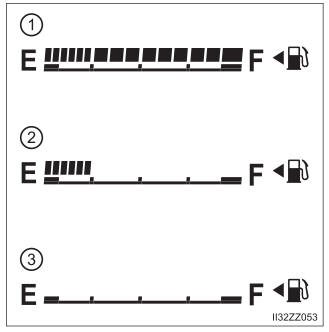Toyota Yaris: Brake System / Brake Assist
During emergency braking situations when it is necessary to depress the brake pedal with greater force, the brake assist system provides braking assistance, thus enhancing braking performance.
When the brake pedal is depressed hard or depressed more quickly, the brakes apply more firmly.
- When the brake pedal is depressed hard or depressed more quickly, the pedal will feel softer but the brakes will apply more firmly. This is a normal effect of the brake assist operation and does not indicate a malfunction.
- When the brake pedal is depressed hard or depressed more quickly, a motor/pump operation noise may be heard. This is a normal effect of the brake assist and does not indicate a malfunction.
- The brake assist equipment does not supersede the functionality of the vehicle’s main braking system.
 Brake Pad Wear Indicator
Brake Pad Wear Indicator
When the disc brake pads
become worn, the built-in wear
indicators contact the disc plates.
This causes a screeching noise to
warn that the pads should be
replaced...
 Hill Launch Assist (HLA)(If equipped)
Hill Launch Assist (HLA)(If equipped)
Hill Launch Assist (HLA) is a function which assists the driver in
accelerating from a stop while on a slope. When the driver
releases the brake pedal and depresses the accelerator pedal
while on a slope, the function prevents the vehicle from rolling...
Other information:
Toyota Yaris XP210 (2020-2026) Reapir and Service Manual: Inspection
INSPECTION PROCEDURE 1. INSPECT REAR SEAT OUTER BELT ASSEMBLY (a) Before installing the rear seat outer belt assembly, check the ELR function. NOTICE: Do not disassemble the retractor. (1) When the inclination of the retractor is 12° or less, check that the belt can be pulled from the retractor...
Toyota Yaris XP210 (2020-2026) Reapir and Service Manual: Immobiliser Amp Missing Message (B278E87)
DESCRIPTION A transponder key amplifier is built into the certification ECU (smart key ECU assembly). When a communication malfunction occurs with the transponder key amplifier inside the certification ECU (smart key ECU assembly), this DTC is stored...
Categories
- Manuals Home
- Toyota Yaris Owners Manual
- Toyota Yaris Service Manual
- Adjustment
- G16e-gts (engine Mechanical)
- Opening and Closing the Liftgate/Trunk Lid
- New on site
- Most important about car
Fuel Gauge
The fuel gauge shows approximately how much fuel is remaining in the tank when the ignition is switched ON. We recommend keeping the tank over 1/4 full.

Copyright © 2026 www.toyaris4.com
